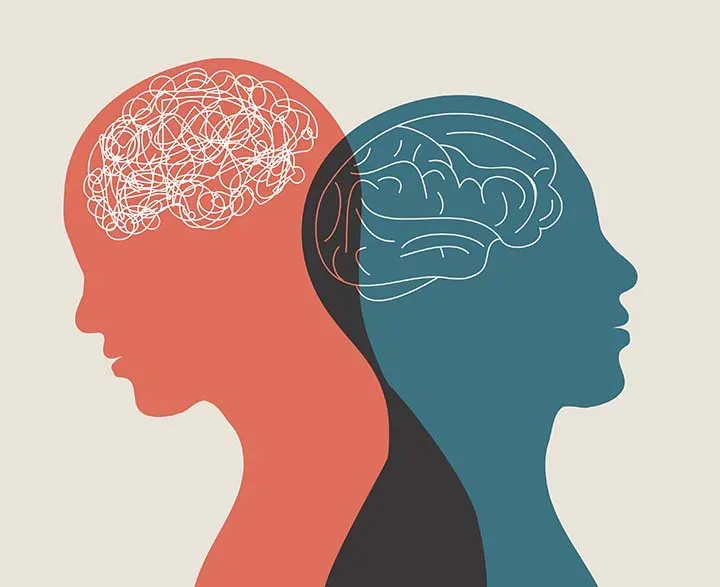
What is Bipolar Disorder?
Bipolar disorder affects the energy level of the person, memory, concentration, appetite, sleep, self-esteem and sleep patterns.
Bipolar disorder’s symptoms vary from person to person in pattern, severity, and frequency. Some people experience frequent mood disruptions while others only a few.
What are the signs and symptoms of Bipolar Disorder?
Its symptoms include patterns of emotional low (depression )and emotional high (mania )
Bipolar disorder is marked by episodes of –
• Stage of severe mania
• Hypomania ( mild to moderate mania ) is the less severe form of mania. In this, the person is able to carry out his day-to-day activities.
• Balanced Mood
• Mild /moderate depression
• Severe depression
What are the other disorders related to Bipolar disorder?
• Anxiety disorders
• Depression
• High suicide rates
Bipolar disorder in infants and children is quite rare. Children exhibit Bipolar disorder symptoms in the form of –anxiety, bed wetting, nightmares, tantrums and lack of activity and interest.
Low serotonin levels in the brain are significant in insomnia, irritability, anger, and depression.
Is Bipolar disorder hereditary?
The exact cause is not completely understood and can run in families.
The neurotransmitter that regulates mood, this phenomena serotonin gets out of balance and functioning of these phenomena runs in families. The majority of individuals with Bipolar disorder have at least one relative in the family suffering from this condition.
• Genetic factors
• Hormonal changes
• Prolonged insomnia
• Constant worry
• Abuse of alcohol, drugs
Who is more prone to get affected by Bipolar disorder?
Bipolar disorder affects men and women equally. It starts between age 15 -25 years of age.
How to diagnose Bipolar disorder?
• Sleep problems
• Physical and mental sluggishness
• Feeling hopeless, sad and empty
• Impaired judgment and impulsiveness
• Delusions and hallucinations
• Sleeping very little
• Jumping from one idea to another
• Unrealistic
• Poor temper control
• Sex with many partners
• Elevated mood –in some cases like talking a lot, hyperactivity
• Substance abuse
What are the various types of Bipolar disorder?
Bipolar I-A a person with bipolar I have at least one manic episode in life.
Bipolar II- A person with bipolar II with mood cycling between high and low over time.
Rapid cycling –A person with rapid cycling experiences four/more episodes of mania or depression in one year.
Slow cycling –A person with slow cycling experiences long periods of mania or depression.
What are the investigations advised in cases of Bipolar disorder?
• A complete history, levels. medical and family history
• Lab examination –for levels.
• Physician recording the mood swings
What are the complications of Bipolar disorder?
• Alcohol and drug abuse
• Suicidal thoughts and behavior
• Problem in relation, to workplace
What treatment is advised in cases of Bipolar disorder?
• Medications
• Psychotherapy
• Mood stabilizing medicines –Lithium, Valproate, Carbamazepine
• Anti-seizure drugs
• Anti-psychotic drugs /anti-anxiety drugs
• Anti-depressant drugs
• ETC (electroconvulsive therapy )
• Transcranial magnetic stimulation (TMS) in this–frequency magnetic pulses is used
What diet is advised and mention other management tips for bipolar disorder?
• Complete education about the disorder
• Avoiding stress by meditation, yoga or deep breathing exercises.
• Maintaining a healthy balance in work and life
• Leading a healthy lifestyle, eating a healthy diet
• Monitoring the mood
• With proper treatment, family and friends a Bipolar disorder person can lead a normal life.
• Regular sessions with a therapist
• Getting enough sleep
• Avoid alcohol and stimulant drugs
• Keeping a daily diary of thoughts
• Consult the doctor for any new medications
• The eating diet rich in fruits, vegetables
• Spending time in sunlight and enjoying nature
• Drinking plenty of water
• Consuming Omega-3 fatty acids
What is the commonly indicated Homeopathic medication for Bipolar disorder?
Hyoscyamus Niger
Tarantula

 If you are unsatisfied with our treatment and do not want to continue the medicines you can ask for refund within 24 hours of making the payment.
If you are unsatisfied with our treatment and do not want to continue the medicines you can ask for refund within 24 hours of making the payment.